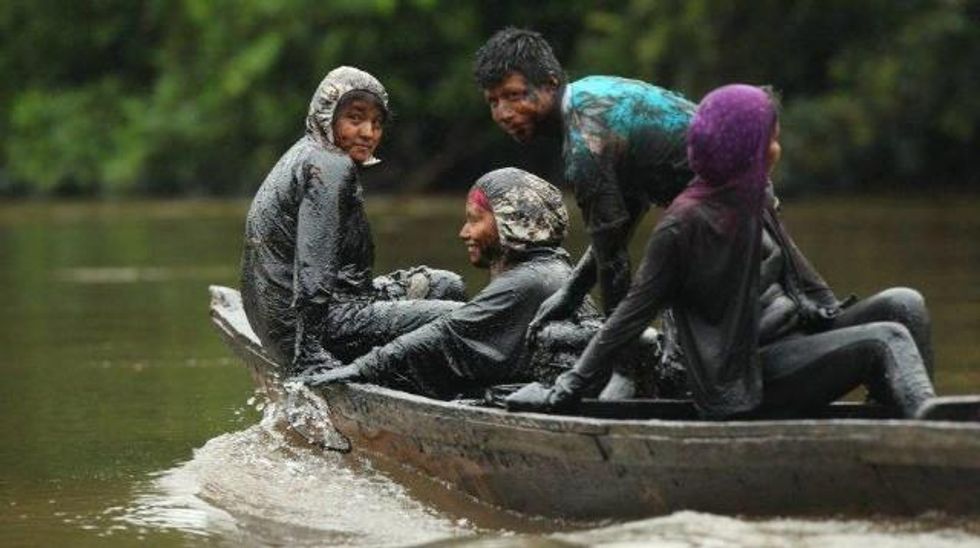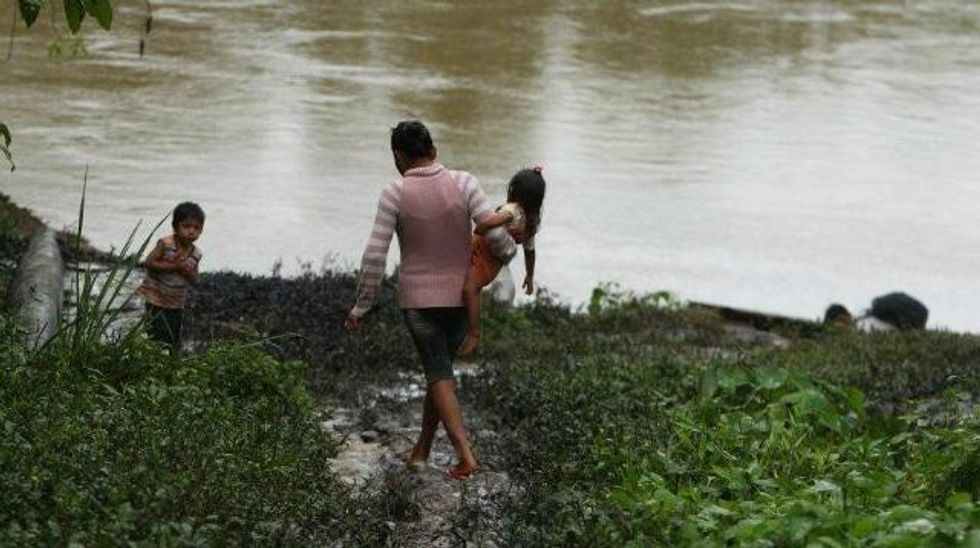

SUBSCRIBE TO OUR FREE NEWSLETTER
Daily news & progressive opinion—funded by the people, not the corporations—delivered straight to your inbox.
5
#000000
#FFFFFF
To donate by check, phone, or other method, see our More Ways to Give page.


Daily news & progressive opinion—funded by the people, not the corporations—delivered straight to your inbox.
A disastrous spate of oil spills in the Peruvian Amazon has gone from bad to worse in recent days, leaving Indigenous tribes frantically trying to clean up the mess left by the nation's state-owned oil company.
The catastrophic ruptures in Petroperu's Northern Peruvian Pipeline occurred on January 25th and February 3rd and have threatened the water supply of nearly 10,000 indigenous people, says Amazon Watch.
On Monday, Petroperu officials confirmed to Reuters that 3,000 barrels of oil had been poured into two critical Amazon River tributaries, the Chiriaco and Morona rivers, which eight Achuar tribes depended on for water.
Critics charge that the spills continued to spread and caused far worse damage after the responsible company, Petroperu, failed to act to contain the oil released by the pipeline breakages.

A third pipeline rupture was rumored on February 19, reports Amazon Watch, but the state-owned petroleum company took to Twitter to deny those reports.
The devastating spills occurred mere months after Indigenous activists staged massive protests against Peru's oil industry in September.
Over the weekend, local activist Marco Arana Zegarra posted horrific images of the oil's spread in the Chiriaco tributary:
\u201cDerrame de petr\u00f3leo en Chiriaco ayer. Ya impusieron leve multa. Cu\u00e1ndo la renuncia de responsables? @FAFrenteAmplio\u201d— Marco Arana \ud83c\uddf5\ud83c\uddea (@Marco Arana \ud83c\uddf5\ud83c\uddea) 1455991426
"Those responsible? Where are they?" Zegarra appealed.
\u201cLos responsables? D\u00f3nde est\u00e1n? En mitin del @FAFrenteAmplio hoy en Lambayeque: destituci\u00f3n de Pdte. de Petroper\u00fa ya!\u201d— Marco Arana \ud83c\uddf5\ud83c\uddea (@Marco Arana \ud83c\uddf5\ud83c\uddea) 1455993213
Waterways flow with black sludge and trees and flowers are rendered nearly unrecognizable by a thick coating of oil in video footage of the spills:
"At least this time," observed Zegarra, "Petroperu has given Indigenous populations suits to wear for cleaning up oil."
\u201cPor la menos esta vez Petroper\u00fa ha dado trajes a poblaciones ind\u00edgenas que son empleadas para limpieza de petr\u00f3leo\u201d— Marco Arana \ud83c\uddf5\ud83c\uddea (@Marco Arana \ud83c\uddf5\ud83c\uddea) 1455906548
Petroperu president German Velasquez "denied reports the company paid children to clean up the oil," reports the Guardian, but then he went on, perhaps damningly, to say that "he was evaluating firing four officials, including one who may have allowed children to collect the crude."

"It's important to note that the spills...are not isolated cases. Similar emergencies have emerged as a result of defects in sections of the pipeline," the national environmental regulator said, according to the Guardian.
Reuters reports that the regulator "ordered Petroperu to replace parts of the pipeline and improve maintenance. " The Guardian reports that Petroperu could face fines of up to $17 million if it is proven that the oil spills have affected local health.
"This environmental disaster is just the latest in a long history of oil and gas leaks in the area," laments Indigenous rights group Survival International, observing that "[m]ore" than 70% of the Peruvian Amazon has been leased by the government to oil companies."
The group translates a call to action by AIDESEP. This organization fights for indigenous people in the Peruvian Amazon, in which it pleads for "international public opinion, the media, NGOs and civil society to pay attention to this serious event that puts in danger the lives of thousands of people living in the area who have traditionally been neglected."
Dear Common Dreams reader, The U.S. is on a fast track to authoritarianism like nothing I've ever seen. Meanwhile, corporate news outlets are utterly capitulating to Trump, twisting their coverage to avoid drawing his ire while lining up to stuff cash in his pockets. That's why I believe that Common Dreams is doing the best and most consequential reporting that we've ever done. Our small but mighty team is a progressive reporting powerhouse, covering the news every day that the corporate media never will. Our mission has always been simple: To inform. To inspire. And to ignite change for the common good. Now here's the key piece that I want all our readers to understand: None of this would be possible without your financial support. That's not just some fundraising cliche. It's the absolute and literal truth. We don't accept corporate advertising and never will. We don't have a paywall because we don't think people should be blocked from critical news based on their ability to pay. Everything we do is funded by the donations of readers like you. Will you donate now to help power the nonprofit, independent reporting of Common Dreams? Thank you for being a vital member of our community. Together, we can keep independent journalism alive when it’s needed most. - Craig Brown, Co-founder |
A disastrous spate of oil spills in the Peruvian Amazon has gone from bad to worse in recent days, leaving Indigenous tribes frantically trying to clean up the mess left by the nation's state-owned oil company.
The catastrophic ruptures in Petroperu's Northern Peruvian Pipeline occurred on January 25th and February 3rd and have threatened the water supply of nearly 10,000 indigenous people, says Amazon Watch.
On Monday, Petroperu officials confirmed to Reuters that 3,000 barrels of oil had been poured into two critical Amazon River tributaries, the Chiriaco and Morona rivers, which eight Achuar tribes depended on for water.
Critics charge that the spills continued to spread and caused far worse damage after the responsible company, Petroperu, failed to act to contain the oil released by the pipeline breakages.

A third pipeline rupture was rumored on February 19, reports Amazon Watch, but the state-owned petroleum company took to Twitter to deny those reports.
The devastating spills occurred mere months after Indigenous activists staged massive protests against Peru's oil industry in September.
Over the weekend, local activist Marco Arana Zegarra posted horrific images of the oil's spread in the Chiriaco tributary:
\u201cDerrame de petr\u00f3leo en Chiriaco ayer. Ya impusieron leve multa. Cu\u00e1ndo la renuncia de responsables? @FAFrenteAmplio\u201d— Marco Arana \ud83c\uddf5\ud83c\uddea (@Marco Arana \ud83c\uddf5\ud83c\uddea) 1455991426
"Those responsible? Where are they?" Zegarra appealed.
\u201cLos responsables? D\u00f3nde est\u00e1n? En mitin del @FAFrenteAmplio hoy en Lambayeque: destituci\u00f3n de Pdte. de Petroper\u00fa ya!\u201d— Marco Arana \ud83c\uddf5\ud83c\uddea (@Marco Arana \ud83c\uddf5\ud83c\uddea) 1455993213
Waterways flow with black sludge and trees and flowers are rendered nearly unrecognizable by a thick coating of oil in video footage of the spills:
"At least this time," observed Zegarra, "Petroperu has given Indigenous populations suits to wear for cleaning up oil."
\u201cPor la menos esta vez Petroper\u00fa ha dado trajes a poblaciones ind\u00edgenas que son empleadas para limpieza de petr\u00f3leo\u201d— Marco Arana \ud83c\uddf5\ud83c\uddea (@Marco Arana \ud83c\uddf5\ud83c\uddea) 1455906548
Petroperu president German Velasquez "denied reports the company paid children to clean up the oil," reports the Guardian, but then he went on, perhaps damningly, to say that "he was evaluating firing four officials, including one who may have allowed children to collect the crude."

"It's important to note that the spills...are not isolated cases. Similar emergencies have emerged as a result of defects in sections of the pipeline," the national environmental regulator said, according to the Guardian.
Reuters reports that the regulator "ordered Petroperu to replace parts of the pipeline and improve maintenance. " The Guardian reports that Petroperu could face fines of up to $17 million if it is proven that the oil spills have affected local health.
"This environmental disaster is just the latest in a long history of oil and gas leaks in the area," laments Indigenous rights group Survival International, observing that "[m]ore" than 70% of the Peruvian Amazon has been leased by the government to oil companies."
The group translates a call to action by AIDESEP. This organization fights for indigenous people in the Peruvian Amazon, in which it pleads for "international public opinion, the media, NGOs and civil society to pay attention to this serious event that puts in danger the lives of thousands of people living in the area who have traditionally been neglected."
A disastrous spate of oil spills in the Peruvian Amazon has gone from bad to worse in recent days, leaving Indigenous tribes frantically trying to clean up the mess left by the nation's state-owned oil company.
The catastrophic ruptures in Petroperu's Northern Peruvian Pipeline occurred on January 25th and February 3rd and have threatened the water supply of nearly 10,000 indigenous people, says Amazon Watch.
On Monday, Petroperu officials confirmed to Reuters that 3,000 barrels of oil had been poured into two critical Amazon River tributaries, the Chiriaco and Morona rivers, which eight Achuar tribes depended on for water.
Critics charge that the spills continued to spread and caused far worse damage after the responsible company, Petroperu, failed to act to contain the oil released by the pipeline breakages.

A third pipeline rupture was rumored on February 19, reports Amazon Watch, but the state-owned petroleum company took to Twitter to deny those reports.
The devastating spills occurred mere months after Indigenous activists staged massive protests against Peru's oil industry in September.
Over the weekend, local activist Marco Arana Zegarra posted horrific images of the oil's spread in the Chiriaco tributary:
\u201cDerrame de petr\u00f3leo en Chiriaco ayer. Ya impusieron leve multa. Cu\u00e1ndo la renuncia de responsables? @FAFrenteAmplio\u201d— Marco Arana \ud83c\uddf5\ud83c\uddea (@Marco Arana \ud83c\uddf5\ud83c\uddea) 1455991426
"Those responsible? Where are they?" Zegarra appealed.
\u201cLos responsables? D\u00f3nde est\u00e1n? En mitin del @FAFrenteAmplio hoy en Lambayeque: destituci\u00f3n de Pdte. de Petroper\u00fa ya!\u201d— Marco Arana \ud83c\uddf5\ud83c\uddea (@Marco Arana \ud83c\uddf5\ud83c\uddea) 1455993213
Waterways flow with black sludge and trees and flowers are rendered nearly unrecognizable by a thick coating of oil in video footage of the spills:
"At least this time," observed Zegarra, "Petroperu has given Indigenous populations suits to wear for cleaning up oil."
\u201cPor la menos esta vez Petroper\u00fa ha dado trajes a poblaciones ind\u00edgenas que son empleadas para limpieza de petr\u00f3leo\u201d— Marco Arana \ud83c\uddf5\ud83c\uddea (@Marco Arana \ud83c\uddf5\ud83c\uddea) 1455906548
Petroperu president German Velasquez "denied reports the company paid children to clean up the oil," reports the Guardian, but then he went on, perhaps damningly, to say that "he was evaluating firing four officials, including one who may have allowed children to collect the crude."

"It's important to note that the spills...are not isolated cases. Similar emergencies have emerged as a result of defects in sections of the pipeline," the national environmental regulator said, according to the Guardian.
Reuters reports that the regulator "ordered Petroperu to replace parts of the pipeline and improve maintenance. " The Guardian reports that Petroperu could face fines of up to $17 million if it is proven that the oil spills have affected local health.
"This environmental disaster is just the latest in a long history of oil and gas leaks in the area," laments Indigenous rights group Survival International, observing that "[m]ore" than 70% of the Peruvian Amazon has been leased by the government to oil companies."
The group translates a call to action by AIDESEP. This organization fights for indigenous people in the Peruvian Amazon, in which it pleads for "international public opinion, the media, NGOs and civil society to pay attention to this serious event that puts in danger the lives of thousands of people living in the area who have traditionally been neglected."